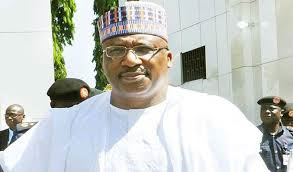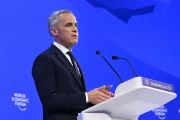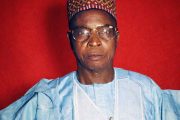It is no longer clear whether it is a real story or one of those high class jokes made to taste about a top dog, a country or some event in international politics. But it used to be told a few years back how both the late Boutros Boutros-Ghali and Madeline Albright, former UN Secretary-General and US Secretary of State respectively responded to their questioners indicating Nigeria as that country to retire to. And when asked why, they both said because Nigeria is more abstract than the most abstract thing imaginable. In other words, Nigeria can embarrass the best research methodologist in the world. Nigeria’s ebb and flow does not obey the variables that political scientists, international relations experts, economists, psychologists or whatever experts put together to make predictions. It flows according to its own logic. This is such that, under Abacha, former President Clinton said categorically that they do not understand Nigeria. Later, former President Obasanjo said something about Nigeria being capable of looking so gloomy in the morning but only to brighten up by midday and to be so much at peace with itself before late evening.
Professor Bolaji Akinyemi, former Minister of Foreign Affairs has warned against believing in any such sense of Nigerian exceptionalism or invulnerability to stuff happening elsewhere in all cases. He might be right but that very sense of exceptionalism might be Nigeria’s greatest national security guarantee. By 2015, almost everyone thought Nigeria would explode. But it did not. Instead, 2015 came and passed rather peacefully in Nigeria.
There was an explosion but it turned out a very pleasant one. Not only was there total unity behind a particular candidate in an election between a northern Muslim and a Southern Christian, the incumbent who was feared to be capable of digging in did nothing of that. It was another manifestation of the Nigerian exceptionalism.
However, a year or so after the clockwork transition from an incumbent to the opposition, discordant tunes fill the Nigerian political air. And stalemates are developing, some totally new, many old problems in new containers but all of them suggestive of a serious and steep downward climb. What might these stalemates be?

Gen Danbazzau,Minister of Interior

EFCC

The president and ‘the warriors’
The country that earnestly yearned for ‘Change’ slightly over a year ago is now saying there has been no Change. The president says yes, there has been no change as such but only because some people who looted the nation to coma before he arrived on the scene have simply re-organised and found strength in the solidarity of looters as to organise insurgency in the Niger Delta and bring the economy to its knees. Those the president had in mind have retorted somehow by denying it. While many believe that, being the president, Buhari must ehave his information before saying so, many others wonder if that doesn’t raise more questions about the president’s grip on power or even conception of power. Given what happened in the Niger Delta between 2004 and 2009 when Yar’Adua’s amnesty was worked out, is it possible for the president to have thought that there wouldn’t be anything of the nature of the Avengers in post Jonathan Nigeria, irrespective of who instigated it? That is, observers find it difficult to believe that neither the president nor any actors in the coalition of forces that assisted in his return to power anticipated this sort of scenario, not to talk of any attempt at preventive diplomacy. Secondly, is it possible that the president reflected upon and concluded that no symbolic actions could have checkmated the coming of the Avengers? Or were there such actions and they produced no positive results? This stalemate is the most painful because it is sowing seeds of future recriminations over resource nationalism in Nigerian politics. As usual, the victims of this stalemate are the common people.
The Siege in the Rural Areas
The president arrived the seat of power harping on three items which sums up governance under this regime. These are the economy, an anti-corruption war and security. As these three are not holistically linked to each other in terms of a critique of the status quo, it puts the president or the regime within the firing range of the contradictions each embody. For instance, security is the third of the three – item agenda. Yes, Boko Haram has been substantially degraded but many, many people can no longer go to their villages anymore unescorted, either by private guards or such a similar arrangement. Local squads have outlawed the state in many communities. It was reassuring news to hear the recent announcement by the Chief of Army Staff regarding a nationwide push to free all victims of kidnap and abduction, etc. Otherwise, the pushing out of the state from rural areas is always a bad signal in the analysis of national security in Africa’s typical post colonial state.
Stalemate in the Anti-Corruption War
The case of the anti-corruption war is worst. People’s anger against corruption is high but so also is popular disappointment against economic confusion that characterised the rise of the regime. And it seems things have worked out in such a way that anti-corruption war appears to have lost considerable bite. Everything is further compounded by the absence of a conscientisation exercise within the power elite that would have produced a consensus. In the course of time, those alleged to be corrupt are bound to have found strength in such contradictions. And that presents a funny stalemate in which both the regime and those on trial are praying for something to happen next that would end it all quickly like a bad dream.
Sale of Remaining National Assets
The image comes out that Avengers as well as what some critics would call wrong economic policies have produced a recession which some interests are capitalising upon to complete the task of selling to themselves the national assets left unsold yet. Two dominant actors are at work: those who are pushing the idea just as there are those opposing it. This time, those pushing the idea reduced in number considerably while those in opposition increased. Not only that, they floored the protagonists in the Senate even when the Senate President was evidently in favour of selling those assets. The interests aligned to selling national assets might still succeed in doing so because labour and the civil society are relatively weak but the exercise has been considerably delegitimized. And buyers might be doing so at their own risk considering what happened when the Yar’Adua regime reversed some of the sales conducted under the Obasanjo regime. Instructively, Obasanjo is now putting qualifiers in the strategy of selling national assets to get out of economic recession. This remains a major stalemate, dovetailing into the larger economy. The economy is privileged in the regime’s three – point agenda but only to confront a situation where delivering is impossible. To get oil flowing again, the government has to go into negotiation with several layers of militants whose peace terms cannot but eat deep into stateness in several domains, tangible and intangible. Meanwhile, employment figures are rising



























